Distinguished Critique: The Question (vol. 2): Poisoned Ground Review
The adventures of a morally comprised, fallible vigilante continue as O'Neil and Cowan dive into the murkiness through which Vic Sage swims
—by Nathan on October 8, 2025—
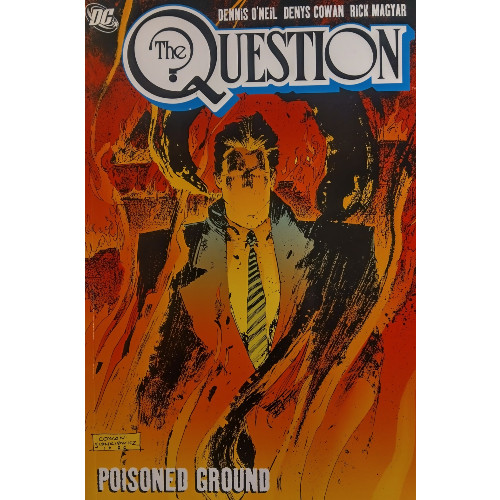
Stop me if you've heard these before:
"How many Hubbies does it take to screw in a light bulb?" "One. But the bulb has to be broken first!"
"What happens when a Hubbie doesn't pay his garbage bill?" "They stop delivery!"
"Did you hear about the Hubbie terrorist who tried to blow up a bus?" "He burned his lips on the exhaust pipe!"
Not doing much for ya, huh? Ah, it must be because you're not from Hub City, stomping grounds of one Vic Sage, the journalist-turned-vigilante known as the Question. Maybe the jokes are an acquired taste; ya really gotta live in Hub City to know just how much of a sinkhole the place is. When your mayor does nothing but drink his liquor cabinets dry and then some, you know you're in for a bit of a pickle…though it may just be a cucumber, because the mayor might drink the brine and vinegar, too!
Me, I'm just passing through. I paid a visit to Hub City not too long ago to see how Dennis O'Neil and Denys Cowan kicked off their acclaimed take on the Question, a hero DC acquired from the defunct Charlton Comics. They took a guy with no face and shot him in the head, but don't worry, Vic's okay. He's still a crusading reporter, still a costumed adventurer by night, still pining for a woman he can't have because she's married to Hizzoner.
Yeah, things can get rough for the Question, particularly when he's faced with difficult answers…if he can find answers at all.
The Question: Poisoned Ground
Writer: Dennis O'Neil
Penciler: Denys Cowan
Inker: Rick Magyar
Colorist: Tatjana Wood
Letterer: Gaspar Saladino
Issues: The Question #7-12
Publication Dates: August 1987-January 1988
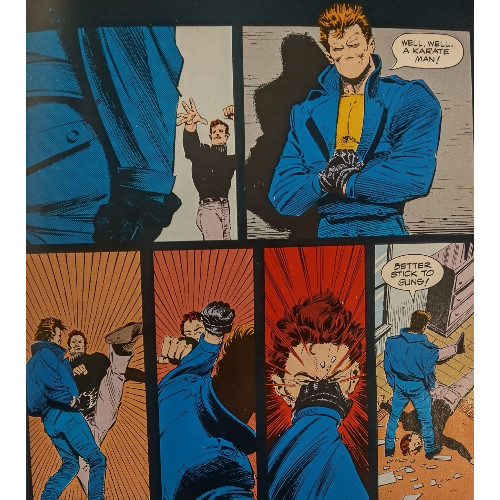
Vic Sage lives to learn the answer to the question "Why?" Oh, sure, he looks for answers to other questions as well, like "Who is behind this recent spate of serial killings?" or "What does a Caribbean drug lord want with my scientist best friend?" or even "How am I ever going to forget the woman I love, the mayor's wife?" but the core questions behind those questions are "Why?"
"Why were these people murdered?"
"Why was my friend kidnapped?"
"Why can't I forget her?"
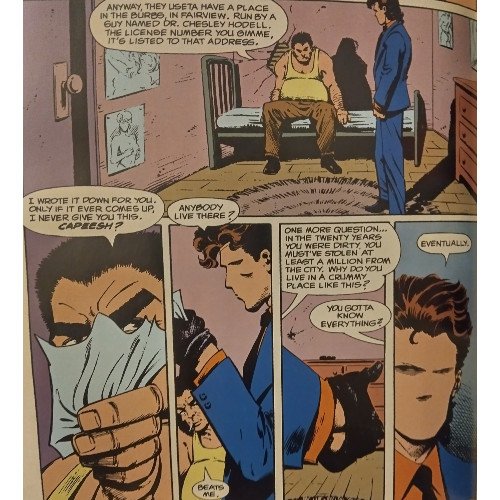
Vic Sage is a funny guy–not in a "cracks wise every page" funny (though some of those "Hub City" jokes earn a chuckle or two), but more in a situational funny kinda way. He's a morally ambiguous vigilante living in a morally ambiguous world, yet his drive is fueled by uncovering the concrete, closing the distance between the unknown and known, erasing the gray dissonance which so often hangs over him and Hub City. People make jokes to ease the tension, to turn something as serious, dark, and depressing as domestic terrorism into a gag. Why? Because, so it seems, it's the way to live in Hub City. But the day the Question believes that to be true, that there isn't something better for the city to hope in, will be the same day he hangs his faceless mask beside his fedora and trenchcoat.
He has to have hope. And he has to put on a mask and dig through the trash or punch someone's lights out to find something tangible to grasp to call "hope."
Dennis and Denys had crafted the hero a strong foundation in the issues collected in the previous volume, and with the quasi-origin out of the way, they can go full bore on Vic Sage's crusade against injustice here. We're not given much of an ongoing narrative, aside from some subplotting I'll reference later, with a few arcs scattered across these pages. But the core concept–Vic seeking to strangle evil to prove some concrete hope exists–drives the volume forward. It's why he lets a guy treat him like a punching bag so he can get information about his missing scientist friend; it's why he waves away a reporting opportunity to instead travel to Bavaria to confirm a dead man's story; it's even why he breaks into some people's houses to discern answers. "Just tell me why," a friend says to Vic before he leaves for Europe. "Because…someone should know the truth," replies the Question. People are going to obscure the truth, bury the truth, kill the truth, or simply ignore the truth…not the Question.
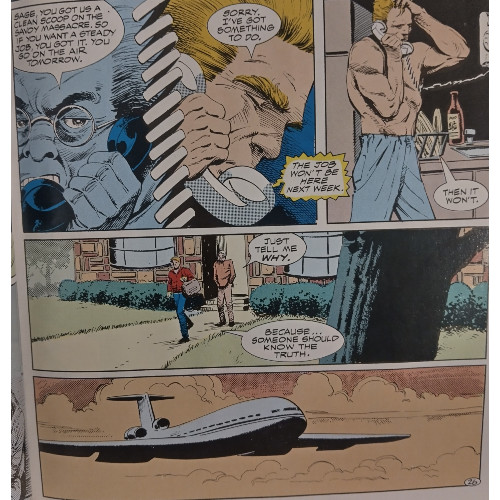
Vic's adventures lead him to make some decisions which reinforce the statement above about him being "morally ambiguous." But the dance with ambiguity appears part and parcel with the superhero job. You always see Batman sneaking into apartments and warehouses or trespassing on people's property to find evidence or confront adversaries. I discussed fairly recently how Mike Grell brought Oliver Queen solidly over to the "anti-hero" side in Green Arrow. Ollie's approach tends to be founded in his staunch beliefs of right and wrong–he knows the correct outcome, as he defines "right" and "wrong," yet he sometimes takes risks and makes tenuously justifiable decisions in order to achieve those ends.
O'Neil does something similar with the Question, yet the approach is different. We're not necessarily given the whole "to kill or not kill?" debate other anti-heroes often face; though Vic's adventures can lead to lethal consequences for perpetrators, it's not an aspect he or O'Neil linger on long. Vic is less prone to make morally gray decisions out of a desire to generate a just outcome; he often breaks the law, first, to figure out what that "right" outcome is. When his friend is kidnapped, Vic has no idea the reasons why or even if his buddy has actually willfully gone on with a villain's plan, but he sneaks into a compound in a foreign country to figure the truth out anyway. He takes risks, makes judgement calls, and hopes he's logical enough to suss out the right answer.
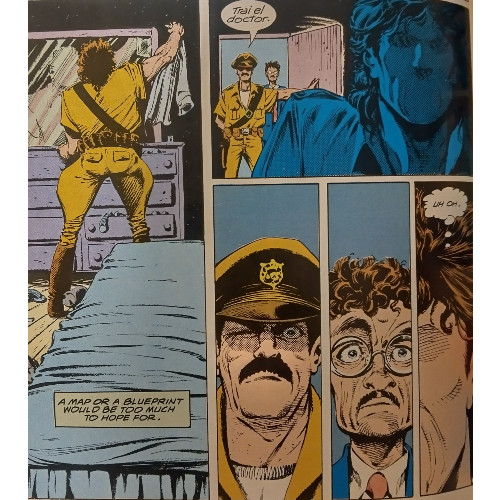
Mostly, Vic is right, but there are times when even his logic and actions are fragmented, both with and without the mask, and O'Neil does well to provide Vic situations where he comes to the wrong answer. There are moments, I believe, where you are meant to wonder whether we're supposed to support Vic's decision-making or question (no pun intended) his motivations. He gets into an argument with his boss at a news station after openly flaunting his pedigree as a reporter; he allows an adversary to unwillingly poison himself because it suits Vic's needs for justice and revenge; he does pursue the woman he loves, the mayor's wife, even though she's still the mayor's wife. Played with a straight face, O'Neil seemingly wants us to feel encouraged by these instances, but part of me feels like this is O'Neil allowing him opportunities to fail. We're offered a balance by Vic's actions, shown how the answer he looks for–or, in some cases, causes to happen–isn't the correct one, not by general standards, anyway.
I keep referencing "the mayor's wife," and I'll clear up right now that she's a character I discussed somewhat in my review of the first volume. Myra lives with a husband who's perpetually drunk and is failing Hub City at every opportunity, even going so far as to get on the wrong side of a former gambling operator, a situation Myra feels she must diffuse. She acts in her husband's name and endeavors to remain faithful to him and his platform, but partially because of events in the last volume, partially because of Vic, she feels torn. Like the Question, Myra is looking for answers, but unlike Vic Sage and his crusading alter ego, she's far more uncertain about what the answers might be.
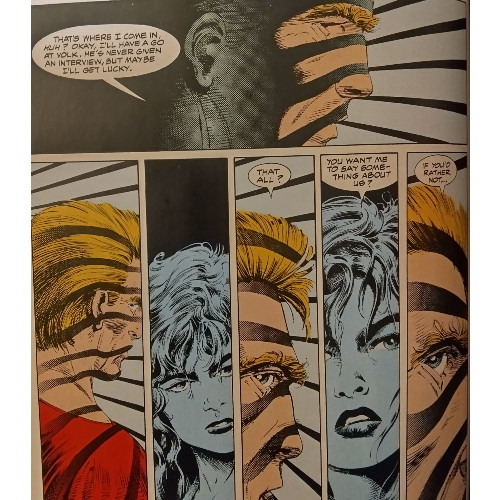
I do wish O'Neil had brought up a plot point concerning Myra from the first volume. Myra makes an incredibly significant, life-altering decision that should have, at the very least, emotional ramifications. Though O'Neil touched on the consequences very briefly near the end of the first volume, he does not bring them up here at all. There is, maybe, the implication that Myra's circumstances have pushed her in a new direction when she decides to run for mayor—maybe that past choice gave her the determination needed? I'm just spitballing, grasping at whatever inference I can, wondering if maybe O'Neil delivered on some subtle development between issues instead of going the obvious route and telling us, point blank, "And this is how Myra changed after that startling choice." Subtlety is preferred to substantial exposition, but here, it's so darn subtle that I'm far more convinced I'm inventing this connection than confidently crediting O'Neil with dabbling with the idea.
I just wish it was clearer…
…though I guess that's why this series is called "The Question" and "The Answer," right? The "answer" is what Vic is on the hunt for throughout each issue, whether it's the answer to his complicated romantic relationships or how to prevent Hub City from descending further into chaos. It's a hunt which asks much of Vic, which demands he makes difficult, morally compromising choices in order to find what the right answer is before he can see it through. So wrestle with him as he walks through the gray haze–wonder along with him if letting an enemy poison himself is right if it means the enemy is stopped, or if there's a better way than becoming someone's punching bag because you need information, or if you should forget the girl you once loved because she's the mayor's wife now (even if she feels more obligated to Hizzoner than loving). "Someone should know the truth," the Question says, and oftentimes, that "someone" is him more than anyone else, because Vic seems more comfortable with paying the price of begrimed hands in exchange for a (mostly) clean conscience.